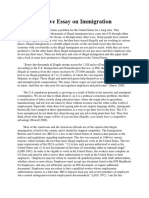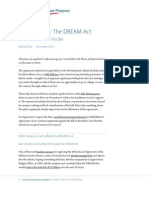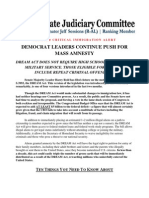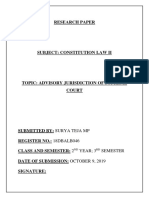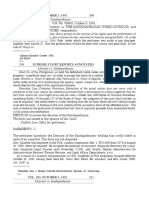0 ratings0% found this document useful (0 votes)
147 views5-7-14 Sign-On Letter To Obama Re Administrative Steps To Help Immigrant Communities
5-7-14 Sign-On Letter To Obama Re Administrative Steps To Help Immigrant Communities
Uploaded by
Peter ScheyThe document proposes several administrative changes to immigration policy that could be made by the President and heads of DHS and DOJ. These include expanding deferred action status to more groups, such as those with approved family or work visas awaiting availability, parents of US citizens, and others. The proposals aim to reduce deportations, protect human rights, and set the stage for immigration reform.
Copyright:
© All Rights Reserved
Available Formats
Download as PDF, TXT or read online from Scribd
5-7-14 Sign-On Letter To Obama Re Administrative Steps To Help Immigrant Communities
5-7-14 Sign-On Letter To Obama Re Administrative Steps To Help Immigrant Communities
Uploaded by
Peter Schey0 ratings0% found this document useful (0 votes)
147 views6 pagesThe document proposes several administrative changes to immigration policy that could be made by the President and heads of DHS and DOJ. These include expanding deferred action status to more groups, such as those with approved family or work visas awaiting availability, parents of US citizens, and others. The proposals aim to reduce deportations, protect human rights, and set the stage for immigration reform.
Original Description:
Community leaders, faith-based leaders, academics, business leaders invited to join a letter to President Obama urging administrative steps he can take to greatly reduce the inhumane treatment of immigrants, including granting legal status to over one million immigrants, without the need for Congressional action. Please read and sign on by emailing pschey@centerforhumanrights.org
Original Title
5-7-14 Sign-On Letter to Obama re Administrative Steps to Help Immigrant Communities
Copyright
© © All Rights Reserved
Available Formats
PDF, TXT or read online from Scribd
Share this document
Did you find this document useful?
Is this content inappropriate?
The document proposes several administrative changes to immigration policy that could be made by the President and heads of DHS and DOJ. These include expanding deferred action status to more groups, such as those with approved family or work visas awaiting availability, parents of US citizens, and others. The proposals aim to reduce deportations, protect human rights, and set the stage for immigration reform.
Copyright:
© All Rights Reserved
Available Formats
Download as PDF, TXT or read online from Scribd
Download as pdf or txt
0 ratings0% found this document useful (0 votes)
147 views6 pages5-7-14 Sign-On Letter To Obama Re Administrative Steps To Help Immigrant Communities
5-7-14 Sign-On Letter To Obama Re Administrative Steps To Help Immigrant Communities
Uploaded by
Peter ScheyThe document proposes several administrative changes to immigration policy that could be made by the President and heads of DHS and DOJ. These include expanding deferred action status to more groups, such as those with approved family or work visas awaiting availability, parents of US citizens, and others. The proposals aim to reduce deportations, protect human rights, and set the stage for immigration reform.
Copyright:
© All Rights Reserved
Available Formats
Download as PDF, TXT or read online from Scribd
Download as pdf or txt
You are on page 1of 6
CENTER FOR HUMAN RIGHTS AND CONSTITUTIONAL LAW
256 SOUTH OCCIDENTAL BOULEVARD
LOS ANGELES, CA 90057
Telephone: (213) 388-8693
Facsimile: (213) 386-9484
www.centerforhumanrights.org
May xx, 2014
President Barack Obama
White House
Secretary Jeh Johnson
Department of Homeland Security
Attorney General Eric H. Holder
Department of Justice
Dear President Obama, DHS Secretary Johnson, and Attorney General Holder:
We are writing to set forth immediate steps the Administration could and should take to dramatically
reduce the adverse consequences of a large undocumented population on U.S. workers and
businesses, the human rights abuses suffered by these migrants, and the harsh and irrational
consequences caused by the Administrations policies of massive deportations, entanglement with
local police through the so-called Secure Communities program, and unparalleled criminalization
of persons who enter without inspection (so-called Operation Streamline).
Below we make a series of straightforward, rational, and cost-effective administrative proposals that
would better protect U.S. workers, better protect the fundamental human rights of immigrants, and
set the stage for eventual Congressional action to improve the current dysfunctional immigration
laws.
In a nutshell, your administrative policies over the past six years have (1) caused the deportation of
hundreds of thousands of immediate relatives of US citizens and lawful permanent residents, (2)
resulted in tens of thousands of criminal convictions of persons for no more than entry without
inspection (making it difficult to impossible for these migrants to ever legalize their status in the
future), (3) resulted in hundreds of thousands of migrants being fired from stable jobs (through
worksite enforcement that largely misses sweatshops) forcing them to turn to sweatshops and
unscrupulous employers to find work (less than 1% leave the US), (4) discouraged thousands of
immigrants from reporting serious crimes for fear of exposure to deportation, (5) incarcerated more
immigrants than ever before at enormous cost to the public and for no sound public safety reasons,
and (6) caused unnecessary and tragic deaths along the border. By now it should be clear that these
policies have done nothing to advance the goal of comprehensive immigration reform. Many of the
proposals below are in line with the same principles as your Administrations extension of Deferred
Action Status to certain youthful arrivals.
The following proposed administrative changes are within the power of the Administration to adopt,
would result in cost-savings to DHS, and would legalize either temporarily or permanently several
million immigrants, many of whom are already in the system with applications pending before
President Barack Obama
Secretary Jeh Johnson
Attorney General Eric H. Holder
April 14, 2014
Page 2 of 6
DHS.
1. Deferred Action Status (DAS): DAS should immediately be extended to the largest population
possible. The Administration should consider extending DAS to all immigrants who would be
eligible to apply for legalization under the Senate bill. If that approach is rejected, below we identify
sub-groups that are obvious candidates for DAS. Granting immigrants DAS and temporary
employment authorization would immediately benefit US workers (by removing the unfair incentive
of unscrupulous employers to hire undocumented migrants over equally or better qualified US
citizens) and the business community which often hires undocumented workers despite full
compliance with federal employer sanctions laws only to suffer sudden and costly losses of workers
as a result of ICE work site enforcement operations. Critically important is to grant these
immigrants advance parole (routinely granted to immigrants with DAS) so they may briefly travel
to visit family in their home countries. Hundreds of thousands of immigrants with already approved
visa petitions are currently blocked from obtaining lawful permanent resident status by the 1996 ten-
year bar (barring lawful resident status for ten years because of one years undocumented status in
the U.S.) but could adjust their status and become lawful permanent residents if granted advance
parole allowing them to briefly depart the U.S. and return lawfully.
Among the obvious sub-groups of immigrants with special equities and long-term residence here
who should be granted DAS are the following:
(a) Immigrants residing in the U.S. with already approved family and work-related visa petitions
who are unable to receive permanent resident status only because of visa backlogs or because of
the zero tolerance 1996 bars to legalization (e.g. people who many years ago made a single
false claim to citizenship or those who have simply lived in the US without authorization for
more than one year). Neither the backlogs nor the 1996 bars have caused these immigrants with
approved visa petitions to self-deport. Instead they simply remain here in undocumented status
unable to take advantage of their approved visa petitions. These immigrants are already in the
USCIS system. DHS knows who they are, where they live, their social security numbers,
criminal histories, etc. Since they are already in the system, are not going to leave the country,
are highly unlikely to be apprehended, and have largely played by the rules, granting this
population Deferred Action Status would be rational policy. Granting those blocked from
legalizing their status by the 1996 10-year bar advance parole (routinely granted to people
with DAS) so they can briefly visit their home countries and return lawfully would allow
hundreds of thousands of these immigrants to adjust their status and promptly become lawful
resident aliens with no change in federal law.
(b) Parents of US citizens. The parents of US citizen children are unable to petition for lawful
permanent resident status until the child turns 21 years of age. Even then, 99.99% of these
immigrants face a 10-year bar for being here for one year or longer in undocumented status (even
if crime free). Under the 1996 amendments, there is NO waiver of the bar for parents who have
raised US citizen children here for 21 years, even though there is a waiver available for someone
who has had a two-week-old marriage arranged over the Internet. Like the other groups
described above, these immigrant have largely been here for many years, are unlikely to self-
deport, and may but are unlikely to be apprehended and removed unless they commit crimes.
President Barack Obama
Secretary Jeh Johnson
Attorney General Eric H. Holder
April 14, 2014
Page 3 of 6
Without employment authorization, the vast majority of these immigrants are working for
employers who prefer undocumented workers over equally qualified US workers.
(c) Immigrants with administratively closed cases. Under the ICE Morton memo, several thousand
immigrants with special equities have had their removal cases administratively closed but have
not been granted temporary employment authorization. They are in the system, ICE knows
who they are, where they live, their social security numbers, etc. Releasing them indefinitely
without employment authorization forces the vast majority of these immigrants to work in
violation of federal law and encourages their employers to exploit them and prefer them over US
workers. They should be granted Deferred Action Status now.
(d) Immigrants with pending employment-related claims. Sound policy suggests that workers with
employment-related claims, which often impact on US workers and working conditions, should
not fear removal if they come forward to bring illegal employment practices to the attention of
the authorities. These immigrants whether involved in pending labor disputes, union drives, or
with pending labor complaints should be granted Deferred Action Status to encourage workplace
compliance with federal and state labor, health and safety, and anti-discrimination laws.
(e) Unaccompanied abused and abandoned minors. Under present policy all unaccompanied minors
apprehended by DHS are placed in removal proceedings. Absent any mandate that these minors
be provided counsel at government expense, as in other civil matters involving children, the
majority of these children face adversarial removal hearings without any type of advocate
representing their interests. The number of unaccompanied children arriving to the U.S., having
fled violence and trauma in their home countries, has increased to historic levels. Until such time
that the "best interests of the child" principle can be upheld with respect to this group of children,
DHS should cease to subject them to the harsh rigors of removal proceedings. To do so would
benefit the already overburdened and backlogged immigration courts and allow these children to
seek administrative remedies outside the time constraining context of removal proceedings.
(f) Expand the DACA program to all immigrants who entered before the age of 16, regardless of
their age today and update DACA continuous residence cut off to June 15, 2013. The rational for
these adjustments are the same as those that prompted approval of the DACA program in the first
place. These changes would improve arbitrary cut-off dates selected in the initial DACA
program. In addition, without a change in federal law the Administration could and should allow
all DACA recipients to enroll in the armed services. Numerous House GOP members have
voiced support for allowing DACAs to enlist, including Reps. Pete King, Paul Ryan, and Buck
McKeon.
(g) Parents of immigrants granted DACA status. By definition this group has lived continuously in
the U.S. for many years (probably most over 20 years). They have raised children here. Their
children have now been granted temporary status. This group is highly unlikely to voluntarily
depart the U.S. and be separated from their children and probably over 90% will never be
apprehended or deported (other than if they commit crimes). Most are likely eligible to seek
stays of removal proceedings under ICEs so-called Morton memo. However, that memo does
not grant recipients temporary employment authorization. As stated above, without employment
President Barack Obama
Secretary Jeh Johnson
Attorney General Eric H. Holder
April 14, 2014
Page 4 of 6
authorization, the vast majority of these immigrants work for employers who prefer
undocumented workers over equally qualified US workers.
While extending DAS to the largest number of immigrants possible would do the most to protect
U.S. workers, reduce job exploitation, and increase tax payments, we believe the sub-groups
identified above are among the most obvious groups to consider for an extension of the Executive
use of Deferred Action Status.
2. Amend regulations to permit USCIS to adjudicate adjustment of status applications for
immigrants with removal orders: There are tens of thousands of immigrants living in the U.S. with
approved visa petitions who qualify for adjustment of status to become permanent residents but have
final orders of removal issued by Immigration Judges and are blocked by current law to have their
cases reopened before the Immigration Judges (because of deadlines to reopen cases) who under
current regulations are the sole authority to adjudicate adjustment applications. Simply amend the
regulations so that USCIS may adjudicate applications for adjustment of status by these immigrants
(who largely already have approved work-related or family-based visa petitions but remain here
indefinitely in undocumented status). Far less desirable and efficient, but alternatively consider
amending the regulations to encourage ICE attorneys to move to reopen completed removal cases so
that qualifying immigrants can have Immigration Judges adjust their status.
3. Expand grandfathering regulations under INA 245i: Under INA 245i as interpreted in
current regulations immigrants who had a petition filed for them on or before April 30, 2001,
may adjust their status in the U.S. based upon the pre-April 2001 petitions or based upon new
applications filed after April 2001. This protection is critically important since the absurd 1996
3- and 10-year bars (and related bars) went into effect requiring that immigrants with approved
visa petitions that are not eligible to adjust their status within the U.S. and must return to their
home countries to obtain lawful resident status must remain in their home countries for ten years.
These bars have not caused immigrants ineligible to obtain permanent resident status to leave the
U.S. but instead has mushroomed the undocumented population living in the U.S. While a
legislative fix is likely necessary to reinstate 245i, your Administration could expand the
regulations (8 CFR 245.10(a) that define who is grand-fathered under 245i (which allows certain
immigrants to obtain permanent resident status in the U.S. and thereby get around the 3- and 10-
year bars) to include, for example, principal immigrants whose spouses are grandfathered under
current regulations, and immigrants substituted on an Application for Alien Employment
Certification filed on or before April 30, 2001 (since the I-140 Approval Notice is issued in the
name of the substituted immigrant and bears the priority date on or before April 30, 2001).
4. Limit detention by encouraging the use of appearance bonds and OR: Detentions under this
Administration have skyrocketed with thousands of immigrants detained for removal proceedings
even though they are likely to appear if released on bond or under appropriate reporting conditions.
This practice is extremely costly (though supported by the private corporations that profit from the
detention policy) and separates family members for months or years while an immigrants
deportability is being evaluated by an over-worked and backlogged immigration Judge system.
Among other things, ICE should adopt nationwide the decision in !"#$%&'() +, !"--%./ "#$%#
&'()$&'* +#,+ $--$.&,/+* 0'+,$/'0 )/0'& 123 4 567% 8' .&,/+'0 , #',&$/. ,9+'& *$: -;/+#* ;9
President Barack Obama
Secretary Jeh Johnson
Attorney General Eric H. Holder
April 14, 2014
Page 5 of 6
0'+'/+$;/< 1=> 0'+,$/* ;?'& @5ABCCC $--$.&,/+* ',%# D',& ,+ , E&$%' +,. ;9 F5 8$GG$;/B '?'/
+#;).# +#' ?,*+ -,H;&$+D ;9 $--$.&,/+* 0; /;+ /''0 +; 8' G;%I'0 )E +; '/*)&' +#'$& ,EE',&,/%'
9;& %;)&+ ;& +; E&;+'%+ +#' E)8G$% 9&;- #,&-<
5. Limiting Operation Streamline: Despite declining illegal crossings on the US Mexico border
(which likely at best account for only 45% of the undocumented population in the US), criminal
prosecutions and summary deportations have skyrocketed over the past six years. Under Operation
Streamline tens of thousands of immigrants have been prosecuted in the federal courts for entry
without inspection, many after brief visits home because a parent or other close relative was
seriously ill or dying. These prosecutions effectively end or make extremely difficult immigrants
ability to legalize their status in the future, result in felony charges upon a second attempted entry,
clog the federal courts with tens of thousands of mostly misdemeanor cases, leave fewer
enforcement resources available to address major drug and smuggling cases, and are associated with
major costs (detention, marshals, judges, prosecutors and court-appointed defense counsel).
Operation Streamline is also used to summarily deport through expedited removal orders
thousands of immigrants apprehended near the border. These orders block future legal immigration.
As happened for decades before Operation Streamline took effect, most first time entrants should be
granted voluntary departure with warnings that a second apprehension may result in formal
deportation which would block their future legalization. Criminal prosecutions should stop other
than for smugglers, immigrants with past serious criminal convictions who seek to re-enter illegally,
and traffickers. Also of note, while Mexicans and Central Americans make up no more than 45% of
the undocumented population, they make up 99% of those facing criminal charges.
6. Limiting the Secures Communities and INA 287(g) programs: Terminate the Secure
Communities (S-Comm) program. S-Comm (local police reporting arrests of undocumented
immigrants to ICE) results in fear of the police, discourages undocumented immigrants, immigrants
with visa petitions pending and lawful immigrants with undocumented family members from
reporting violent crimes or cooperating with criminal investigations, and frequently channels people
into the deportation system despite the insignificance of their alleged crimes. For the same reasons,
reliance on 287(g) programs should be reduced or eliminated. The practice of placing immigration
holds on immigrants in local custody should also be amended so no hold lasts more than 24-48
hours, the time ICE would have to hold a detainee before bringing him or her before an immigration
judge.
7. Reduce border deaths: Inform immigrants apprehended along the border who cooperate in
prosecutions of violent smugglers and traffickers about the availability of U and T visas. Inform
abused and abandoned unaccompanied minors apprehended along the border of the availability of
SIJ visas. Place rescue beacons throughout the border region. Restrict the use of lethal force used by
the Border Patrol to circumstances in which objective facts indicate Border Patrol lives or the lives
of others are in imminent danger. Prohibit the use of high-speed Border Patrol chases when a
number of immigrants are passengers in vehicles used by smugglers. Numerous unnecessary deaths
have been caused by these high-speed Border Patrol chases after the past several years. Technology
can be used to track the smugglers vehicle without engaging in dangerous high-speed chases.
8. Allocate greater resources to timely compliance with FOIA requests. In order to properly defend
President Barack Obama
Secretary Jeh Johnson
Attorney General Eric H. Holder
April 14, 2014
Page 6 of 6
themselves in removal proceedings or successfully present visa petitions, immigrants often need
copies of their immigration records and seek these under the Freedom of Information Act (FOIA).
ICE and CIS are backlogged in responding to FOIA requests and allocating greater resources to
reasonably timely responding to FOIA requests would significantly reduce the filing of petitions
with inaccurate information, avoid the filing of petitions for which immigrants do not even qualify
(for some reason disclosed in the FOIA response), and facilitate the progress of removal proceedings
(often delayed while immigrants attempt to obtain copies of their immigration records).
We urge you to consider adopting these proposals immediately. Adoption of these recommendations
would allow as many as two million immigrants to become eligible to obtain lawful permanent
resident status under current laws while providing temporary protection to thousands of others with
special equities, many already in the DHS system. Thank you for your consideration.
Sincerely,
Peter A. Schey
President, Center for Human Rights and Constitutional Law
Community Organizations Leaders:
Academics:
Faith-based leaders:
Business leaders:
ccs: Alejandro Mayorkas, Deputy Secretary, Department of Homeland Security
Thomas S. Winkowski, Principal Deputy Assistant Secretary, ICE
Stevan E. Bunnell, General Counsel, Department of Homeland Security
Peter S. Vincent, Principal Legal Advisor, ICE
Stevan E. Bunnell, General Counsel, USCIS
Stuart F. Delery, Assistant Attorney General
Denis McDonough, White House Chief of Staff
Rob Nabors, White House Deputy Chief of Staff
Alyssa Mastromonaco, White House Deputy Chief of Staff
Cecilia Munoz, Director, White House Domestic Policy Council
You might also like
- Persuasive Essay DraftDocument8 pagesPersuasive Essay Draftgzf5034No ratings yet
- Form LRA 63Document3 pagesForm LRA 63Twain Jones75% (4)
- GJ Immig Statement (Final)Document3 pagesGJ Immig Statement (Final)anon_87599214No ratings yet
- BIN Memo 2014 Administrative ReliefDocument3 pagesBIN Memo 2014 Administrative ReliefblackimmigrationNo ratings yet
- Petition For Rulemaking Submitted To The Department of HomelandDocument44 pagesPetition For Rulemaking Submitted To The Department of HomelandNational Day Laborer Organizing NetworkNo ratings yet
- Aderholt Bill Issue BriefDocument2 pagesAderholt Bill Issue BriefFederation for American Immigration ReformNo ratings yet
- Midterm PaperDocument6 pagesMidterm Paperapi-319627780No ratings yet
- BIN Policy Brief: Immigration ActionDocument4 pagesBIN Policy Brief: Immigration ActionblackimmigrationNo ratings yet
- Patrick Clowney - Rogerian Argument RevisedDocument6 pagesPatrick Clowney - Rogerian Argument Revisedapi-316945855No ratings yet
- Interior Immigration Enforcement Executive Order - Annotated by The National Immigrant Justice CenterDocument12 pagesInterior Immigration Enforcement Executive Order - Annotated by The National Immigrant Justice CenterNational Immigrant Justice CenterNo ratings yet
- Legal Research PaperDocument19 pagesLegal Research Paperapi-403214689No ratings yet
- Advisory To America Independence Day 2014Document8 pagesAdvisory To America Independence Day 2014PumabydesignNo ratings yet
- JgonzaleslitreviewDocument10 pagesJgonzaleslitreviewapi-288317089No ratings yet
- Argumentative Essay Sample On ImmigrationDocument5 pagesArgumentative Essay Sample On ImmigrationAmeena AimenNo ratings yet
- Statement From President Donald J TrumpDocument3 pagesStatement From President Donald J Trumpcorey_c_mitchellNo ratings yet
- Domestic and Foreign Policy Essay: Immigration: Salt Lake Community CollegeDocument6 pagesDomestic and Foreign Policy Essay: Immigration: Salt Lake Community Collegeapi-533010636No ratings yet
- NAFCON Deferred Action Dream Act Primer August 2012Document5 pagesNAFCON Deferred Action Dream Act Primer August 2012bayanusapnwNo ratings yet
- Memo PolsDocument9 pagesMemo Polsapi-407746058No ratings yet
- SB1070 Activist ToolkitDocument11 pagesSB1070 Activist ToolkitAmnesty WestNo ratings yet
- Extra Credit TwoDocument5 pagesExtra Credit Twopatel.rina1226No ratings yet
- Illegal Immigration EssayDocument5 pagesIllegal Immigration EssayRaymond Paul RollingerNo ratings yet
- Ungjae Han Position PaperDocument6 pagesUngjae Han Position Paperapi-733713162No ratings yet
- Illegal Immigration (Student's Name)Document22 pagesIllegal Immigration (Student's Name)Mahwish IqbalNo ratings yet
- Bishop Elizondo and Bishop Vann's Letter To The U.S. GovernmentDocument3 pagesBishop Elizondo and Bishop Vann's Letter To The U.S. GovernmentNational Catholic ReporterNo ratings yet
- Health Reform: Immigrants' Health Coverage and Health Reform: Key Questions and AnswersDocument7 pagesHealth Reform: Immigrants' Health Coverage and Health Reform: Key Questions and AnswersJesse M. MassieNo ratings yet
- ArgumentessayrealbetaDocument5 pagesArgumentessayrealbetaapi-340743298No ratings yet
- Community Problem Report Final PaperDocument10 pagesCommunity Problem Report Final Paperapi-2835514830% (1)
- Critical Thinking PaperDocument13 pagesCritical Thinking PaperAnonymous PYzK0pDkNo ratings yet
- San Diego Dream Team: Principles For Immigration ReformDocument4 pagesSan Diego Dream Team: Principles For Immigration ReformSanDiegoDreamTeamNo ratings yet
- Post-Election Immigration FutureDocument2 pagesPost-Election Immigration FutureSC AppleseedNo ratings yet
- Deportations for Money: The American Government’s Secret Behind Massive DeportationsFrom EverandDeportations for Money: The American Government’s Secret Behind Massive DeportationsRating: 5 out of 5 stars5/5 (1)
- Public Charge Comment - Daniel Garza, The LIBRE InitiativeDocument2 pagesPublic Charge Comment - Daniel Garza, The LIBRE InitiativeAmericansForProsperityNo ratings yet
- Democrats Abroad Platform 2008Document10 pagesDemocrats Abroad Platform 2008alexNo ratings yet
- The Red Card Solution, November 2010 White PaperDocument41 pagesThe Red Card Solution, November 2010 White PaperSerenety HanleyNo ratings yet
- Interior Enforcement Executive Order Annotated by National Immigrant Justice Center 2017 01 26Document12 pagesInterior Enforcement Executive Order Annotated by National Immigrant Justice Center 2017 01 26Julia ToepferNo ratings yet
- White House Details On Anticipated Administrative ReliefDocument2 pagesWhite House Details On Anticipated Administrative ReliefThe National Immigrant Youth Alliance100% (2)
- ArgumentessayfinalDocument7 pagesArgumentessayfinalapi-340743298No ratings yet
- How To Win The Immigration DebateDocument56 pagesHow To Win The Immigration DebateFederation for American Immigration Reform100% (4)
- Immigration System in AmericaDocument5 pagesImmigration System in AmericaNeriliz SotoNo ratings yet
- Myth vs. Fact: The DREAM ActDocument6 pagesMyth vs. Fact: The DREAM ActCenter for American ProgressNo ratings yet
- Obama's Immigration Memo Executive Action Expanded Deferred Action Boston Immigration Lawyer Joshua Goldstein 617-722-0005Document5 pagesObama's Immigration Memo Executive Action Expanded Deferred Action Boston Immigration Lawyer Joshua Goldstein 617-722-0005Joshua L. Goldstein, Esq.No ratings yet
- Menendez CIR Act of 2010 - Short SummaryDocument3 pagesMenendez CIR Act of 2010 - Short SummaryCarlos GalindoNo ratings yet
- Comprehensive Immigration Reform 3Document5 pagesComprehensive Immigration Reform 3api-272895240No ratings yet
- MockcongressbillDocument3 pagesMockcongressbillapi-336558320No ratings yet
- SB 1070 ThesisDocument8 pagesSB 1070 Thesispattybuckleyomaha100% (1)
- Deferred Action Pros & ConsDocument2 pagesDeferred Action Pros & ConsNYSYLCNo ratings yet
- Final Embargoed FactsheetDocument4 pagesFinal Embargoed FactsheetRobin ReedNo ratings yet
- Research Paper: Granting Undocumented Immigrants Asylum Tafadzwa Ryan Nemarundwe Globalization 137G Portland State UniversityDocument11 pagesResearch Paper: Granting Undocumented Immigrants Asylum Tafadzwa Ryan Nemarundwe Globalization 137G Portland State Universityapi-281571777No ratings yet
- Vaughan Work Permits 2 16Document3 pagesVaughan Work Permits 2 16John HinderakerNo ratings yet
- Immigration Reform Persuasive EssayDocument10 pagesImmigration Reform Persuasive Essayapi-253633137No ratings yet
- Mas-Immigration-Law-Offers-Cornucopia-To-Immigration - Lawyers/#Ixzz2Onu5X8ZbDocument4 pagesMas-Immigration-Law-Offers-Cornucopia-To-Immigration - Lawyers/#Ixzz2Onu5X8ZbAgnes GamboaNo ratings yet
- MCRPDocument6 pagesMCRPapi-336558320No ratings yet
- DREAM ActDocument5 pagesDREAM ActmichellemalkinNo ratings yet
- Basic Social Rights Study - USADocument5 pagesBasic Social Rights Study - USAMiguel GregoryNo ratings yet
- The Modern Immigration Debate: Fully Open BordersDocument3 pagesThe Modern Immigration Debate: Fully Open BordersNick OrzechNo ratings yet
- Redstynes 4Document1 pageRedstynes 4api-302976636No ratings yet
- Final Draft Gov PaperDocument9 pagesFinal Draft Gov Paperapi-308757224No ratings yet
- A Conservative and Compassionate Approach to Immigration Reform: Perspectives from a Former US Attorney GeneralFrom EverandA Conservative and Compassionate Approach to Immigration Reform: Perspectives from a Former US Attorney GeneralNo ratings yet
- Banned: Immigration Enforcement in the Time of TrumpFrom EverandBanned: Immigration Enforcement in the Time of TrumpNo ratings yet
- 5-15-14 Solitary Confinement Sign-On Letter CA SenateDocument3 pages5-15-14 Solitary Confinement Sign-On Letter CA SenatePeter ScheyNo ratings yet
- 5-13-14 Solitary Confinement Sign-On Letter CA SenateDocument3 pages5-13-14 Solitary Confinement Sign-On Letter CA SenatePeter ScheyNo ratings yet
- 5-1-14 Letter Addressed To California Legislature From California Prisoners in Solitary Confinement Who Started The 2013 Hunger StrikeDocument3 pages5-1-14 Letter Addressed To California Legislature From California Prisoners in Solitary Confinement Who Started The 2013 Hunger StrikePeter ScheyNo ratings yet
- 5-3-14 Fin. Alexis Bird Schey Summer Internship ApplicationDocument6 pages5-3-14 Fin. Alexis Bird Schey Summer Internship ApplicationPeter ScheyNo ratings yet
- Secretary'S Certificate: BANAWA FLORES, Be Authorized For and in Behalf of TheDocument2 pagesSecretary'S Certificate: BANAWA FLORES, Be Authorized For and in Behalf of ThekiosalomeoNo ratings yet
- File 4061506199676160319Document5 pagesFile 4061506199676160319Arah OpalecNo ratings yet
- Research Paper: Year 3 SemesterDocument13 pagesResearch Paper: Year 3 Semesterpriyanka0% (1)
- WON The Allegiance of Filipino Citizens To The Philippines Was Suspended During The Japanese Occupation? (NO)Document4 pagesWON The Allegiance of Filipino Citizens To The Philippines Was Suspended During The Japanese Occupation? (NO)ABbo HernandezNo ratings yet
- Llorente vs. Sandiganbayan G.R. No. 85464Document7 pagesLlorente vs. Sandiganbayan G.R. No. 85464Therese ElleNo ratings yet
- People Vs LagmayDocument2 pagesPeople Vs LagmayTenet Manzano100% (2)
- External Aids of InterpretationDocument10 pagesExternal Aids of InterpretationAnna Alphonsa JamesNo ratings yet
- RPC Art 11 DigestDocument5 pagesRPC Art 11 DigestGenevieve TersolNo ratings yet
- 06 Bicol Medical Center V Botor 9Document13 pages06 Bicol Medical Center V Botor 9jiminNo ratings yet
- Durban Apartments v. Pioneer, G.R. No. 179419, January 12, 2011Document10 pagesDurban Apartments v. Pioneer, G.R. No. 179419, January 12, 2011Alan Vincent FontanosaNo ratings yet
- Grace Marks For Getting Higher ClassDocument2 pagesGrace Marks For Getting Higher ClassNAGAR CARTNo ratings yet
- Colinares v. People - ProbationDocument1 pageColinares v. People - ProbationShari Realce AndeNo ratings yet
- Disini vs. Secretary of JusticeDocument61 pagesDisini vs. Secretary of JusticeDoreen GarridoNo ratings yet
- US vs. BogelDocument2 pagesUS vs. BogelWilfredNo ratings yet
- McNutt v. General Motors Acceptance Corp., 298 U.S. 178 (1936)Document9 pagesMcNutt v. General Motors Acceptance Corp., 298 U.S. 178 (1936)Scribd Government DocsNo ratings yet
- Pre Trial Order and Minutes of Pre Trial Template 2021Document10 pagesPre Trial Order and Minutes of Pre Trial Template 2021Mariel Grace DelinNo ratings yet
- Acctg 202 A Module Part TwoDocument190 pagesAcctg 202 A Module Part TwoColeen gaboyNo ratings yet
- 14 Heirs of Regoso v. CADocument1 page14 Heirs of Regoso v. CAKarla EspinosaNo ratings yet
- 2) Terry Schiavo CaseDocument2 pages2) Terry Schiavo CaseAj Guadalupe de MataNo ratings yet
- Navarro v. EscobidoDocument8 pagesNavarro v. EscobidoClaudine Ann ManaloNo ratings yet
- Business Law NotesDocument10 pagesBusiness Law Notessanthosh kumaranNo ratings yet
- Simmons V Bauer Media 2nd District OpinionDocument14 pagesSimmons V Bauer Media 2nd District OpinionTHROnlineNo ratings yet
- Leave and License Agreement: Particulars Amount Paid GRN/Transaction Id DateDocument5 pagesLeave and License Agreement: Particulars Amount Paid GRN/Transaction Id DatekajalNo ratings yet
- Nolan Tolson, III v. Rudolph Preston Ander Stubbs Gregory Blue, 914 F.2d 1492, 4th Cir. (1990)Document2 pagesNolan Tolson, III v. Rudolph Preston Ander Stubbs Gregory Blue, 914 F.2d 1492, 4th Cir. (1990)Scribd Government DocsNo ratings yet
- CPP Practice ExamDocument4 pagesCPP Practice ExamVon Dominic0% (2)
- Thompson V BarbozaDocument7 pagesThompson V BarbozabaystateexaminerNo ratings yet
- ExtraditionDocument13 pagesExtraditionDivya UpretiNo ratings yet
- NOTES (Company Law)Document109 pagesNOTES (Company Law)ALYSSA TOHNo ratings yet
- 04 Torres V de LeonDocument2 pages04 Torres V de LeonGee Ann BerdinNo ratings yet














